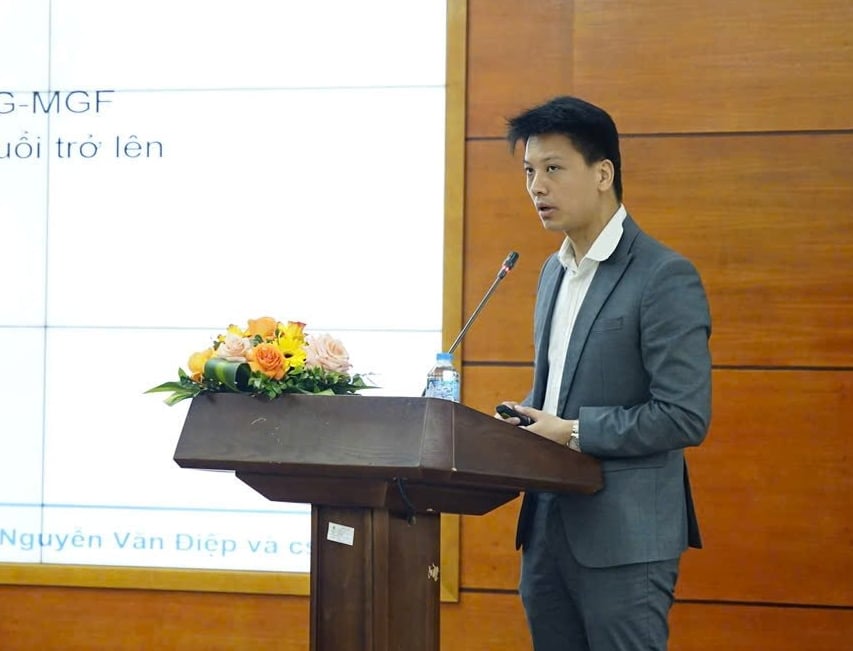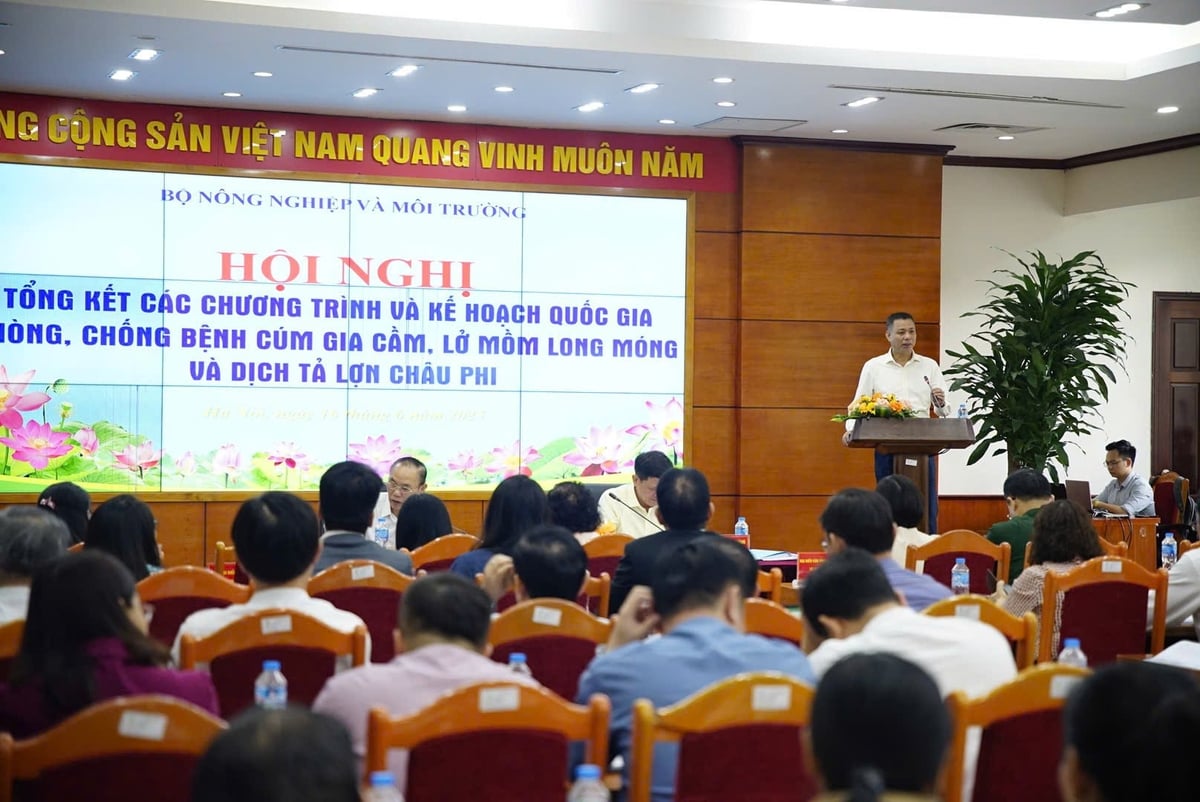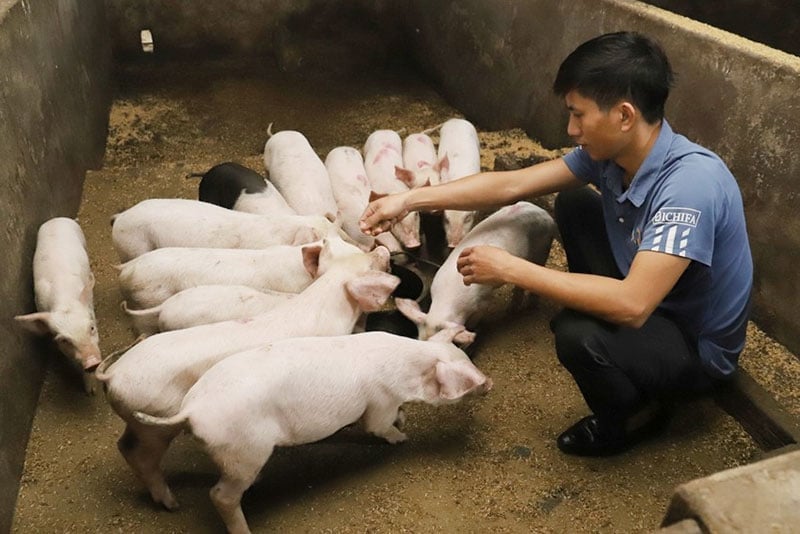December 19, 2025 | 18:55 GMT +7
December 19, 2025 | 18:55 GMT +7
Hotline: 0913.378.918
December 19, 2025 | 18:55 GMT +7
Hotline: 0913.378.918

General Director of AVAC Vietnam Joint Stock Company Nguyen Van Diep shares about the achievements of implementing DTLCP vaccine. Photo: Linh Linh.
At the conferrence on reviewing national programs and plans on African swine fever (ASF), foot-and-mouth disease (FMD), and avian influenza (AI), Mr. Nguyen Van Diep, CEO of AVAC Vietnam Joint Stock Company, announced encouraging results following nearly two years of deploying the AVAC ASF LIVE vaccine. This is Vietnam’s first live attenuated vaccine against ASF, approved for use by the Department of Animal Health (formerly the Department of Veterinary Services) since July 2022 and commercially distributed nationwide since July 2023.
To date, AVAC has supplied around 5 million doses, of which approximately 3.5 million were used domestically, with the remainder exported to the Philippines, Indonesia, and several other Asian countries. The vaccine has demonstrated up to 90% protective efficacy after just one dose, with immunity lasting 4–5 months. Importantly, it does not negatively affect growth or reproduction performance and does not interfere with the efficacy of other vaccines when administered concurrently. AVAC ASF LIVE has been monitored and assessed at 610 facilities, proving safe and effective even when used in outbreak zones.
Data from provinces such as Lang Son, Cao Bang, Hai Duong, and Quang Ngai show 100% antibody response in vaccinated pigs, with no transmission of the virus to unvaccinated herds. In Son La, a northern mountainous province with large-scale livestock operations, ASF vaccination has been widely implemented, supported by a combination of public funding, private contributions, and community engagement. Vice Chairman of the Son La People’s Committee, Mr. Nguyen Thanh Cong, emphasized: “For large-scale livestock farms, without vaccines and biosecurity, the potential damage is massive”.
Despite these successes, delegates acknowledged that the overall ASF vaccination rate remains low. Mr. Diep attributed this to lingering skepticism toward new vaccines, high costs for small-scale farmers, limited access to information, and a lack of impactful demonstration models. Another barrier lies in the short-term mindset of some farmers.

Vice Chairman of Son La Provincial People's Committee, Mr. Nguyen Thanh Cong said that the ASF vaccination program has been widely deployed, combining the state budget, socialization and contributions from the community. Photo: Linh Linh.
“According to guidelines, the vaccine should be administered in the fourth week of a piglet’s life, with immune response monitored over the next three weeks. However, smallholders raising fewer than 100 pigs often delay until the fourth month, right before slaughter, or sell their pigs after only two months. This complacency results in inadequate immunization coverage”, said Mr. Cong. He stressed that early vaccination is essential to forming a proactive immune barrier and preventing outbreaks.
Mr. Cong also underlined that vaccination efforts require more than supply and affordability; they demand close coordination between authorities, businesses, and farmers. Communication programs must be tailored to local needs and clearly explain the long-term benefits of vaccination in safeguarding both livestock and livelihoods. He called on the Ministry of Agriculture and Environment to promptly develop vaccine support mechanisms, ensure fair pricing, allocate resources to high-risk areas, and ramp up research into biosecure farming technologies.
If vaccination rates fail to reach 74% to 84% of the total pig population, herd immunity will be insufficient to halt disease transmission.

If the vaccination rate does not reach at least 74% to 84% of the total herd, community immunity will not be strong enough to stop the spread of the disease. Photo: Ha Tinh Newspaper.
Echoing this concern, Dr. Pawin Padungtod, Senior Technical Coordinator of the FAO’s ECTAD program in Vietnam, noted that the FAO and the Korean government are jointly implementing a project to strengthen ASF control capacity in Vietnam. A key goal is to evaluate the impact of AVAC ASF LIVE, thereby generating scientific evidence to support the country’s ASF control strategy for 2026–2030.
“The FAO believes that vaccine implementation will be a cornerstone for Vietnam to establish a proactive disease control strategy and move toward safe, sustainable, and internationally integrated livestock production”, said Dr. Padungtod.
From an enterprise perspective, Mr. Diep proposed adding the ASF vaccine to Vietnam’s list of mandatory vaccines. This would help establish herd immunity and reduce disease pressure, especially in high-risk zones. To scale up effectively, he recommended price support policies, technical guidance, and a clear implementation roadmap. “Vaccination is the first biological barrier,” he stressed, “but if we don't achieve coverage of at least 74% to 84% of the herd, herd immunity won’t be strong enough to stop disease spread”.
Although only commercially available since mid-2023, the ASF vaccine has already delivered tangible results in several localities. Amid the persistent risk of disease, proactively using vaccines, alongside stricter transport controls, enhanced surveillance, and support for small-scale farmers, is the only path toward biosecurity and sustainable livestock development in Vietnam. Achieving this will require stronger national policies, local financial commitment, and a shift in mindset across the farming community.
Translated by Dieu Linh

(VAN) Risk assessment in food safety management not only helps protect public health but also promotes sustainable development.

(VAN) Prime Minister chaired the 26th meeting of the National Steering Committee on Illegal, Unreported, and Unregulated (IUU) Fishing.

(VAN) Cuba is currently streamlining procedures to attract investors, with many new policies shaped by the practical experiences of Vietnamese projects operating in the country.

(VAN) Patrol Team No. 15 has been executing patrol, inspection, and control duties in the Southwest waters, a region identified as having a high risk of violations.

(VAN) UNICEF, IOM, and the U.S. Department of State have worked together to ensure the justice system becomes a protective shield for children and other vulnerable groups.

(VAN) As a key driving force of green transition, the circular economy is being identified as a strategic pillar of Viet Nam's new growth model.

(VAN) UNICEF and IOM receive this aid and provide essential services to assist families affected by recent storms and floods.